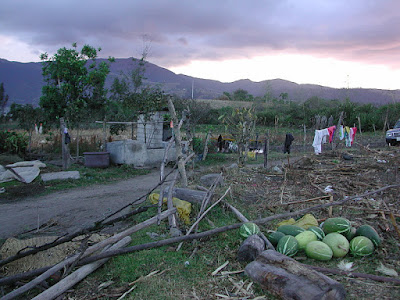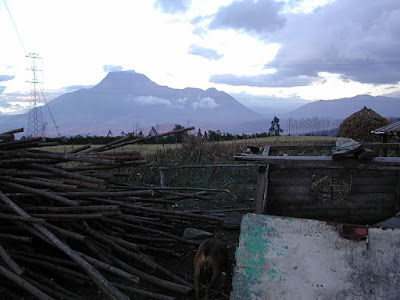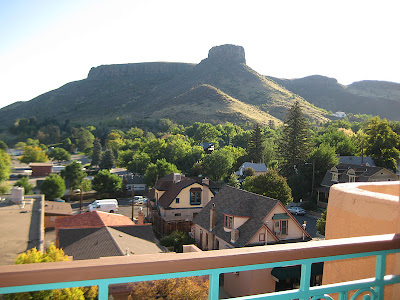
Maria Virginia's parents, 2005
Hi guys,
One question I'm often asked is how my anthropology background informs my writing. I talked a bit about this a year or so ago in an interview with the wonderful blogger Charlotte
. (You can read the interview here.)
 outside of Maria's parents' house
outside of Maria's parents' house
I thought it might be interesting to talk more about my anthropology background in terms of Maria's and my process of creating
The Queen of Water-- the book in which I most consciously used my anthropological training. In the initial stages, I approached this project the way I did my Master's thesis-- listening to Maria recount the story of her life (tape-recorded), asking her lots of questions along the way, and looking at her story (including the language she used) through an anthropological lens-- searching for layers of meaning-- emotional, social, cultural, etc. (And of course, I also spent time in Maria's native village with her family and read academic books on socio-cultural issues in the Andes.) The difference with
Queen is that I could take it a step farther than my Master's thesis because Maria was an active participant throughout the entire process. We went over every scene many times and explored these layers of meaning. Maria is so intelligent, self-aware, and perceptive that we were able to have fascinating on-going discussions about her experiences in terms of class, gender, and ethnicity.
 Maria's parents' house (used to be clay, now cement block)
Maria's parents' house (used to be clay, now cement block)
Here's an example: She often described people in terms of their weight and skin color-- features that we talked about extensively; together, we broke down the emotional, social, economic, and cultural meanings of her descriptions. In the impoverished indigenous community where she was born in the 1970's, it was considered beautiful to be plump, which isn't surprising considering the food scarcity. (Her village was one of the poorest in all of Ecuador.) When young Maria refers to her older sister (who left at a young age to be a maid) as plump, this is considered a good thing because it means she has more than enough food. In contrast, during Maria's early childhood, she was thin because of malnourishment and poverty. Young Maria also describes her sister as being fair-skinned, which again, she considers a good thing, as it indicates that her sister is now part of a higher social class that doesn't have to work in the fields to earn a living.
 Maria's parents' cow
Maria's parents' cow
Young Maria notes, with the fascination of a little girl, that the Doctorita (a mestiza) has more body fat than the women in her village. This sets the Doctorita apart as having money and belonging to a higher social class. But after Maria has lived with the Doctorita and started to internalize middle-class mestizo values of beauty (as seen on TV, in the exercise book, and expressed by people in town) she becomes critical of the Doctorita's weight. She sees it as a weakness, as undesirable. As a teen, Maria's bout with anorexia is tied up with these class-related notions of weight and skin color. She wants to become thin and pale, since that's what she perceives as culturally desirable in her new social milieu.
 Maria's parents' house
Maria's parents' house
I think that as an anthropologist and a writer, it's essential not to impose your own cultural assumptions on other societies. And it's essential to understand that within each unique society you're dealing with, there are complex, multi-faceted, and layered meanings behind descriptions of characteristics like weight and skin color. I was glad to have developed this perspective in my anthropology coursework and research-- I think it helped me to not take any elements of Maria's story at face value, but thoroughly explore these cultural meanings together with her... which is one reason the book took six years to write. ;)

view from Maria Virginia's parents' yard
I have lots more about the process of writing Queen on my website... You can read an interview with Maria and learn which elements of her story were slightly fictionalized
here.
Okay, Lil Dude keeps bursting in the room to ask if I'm ready to go to the river.... must go now! Thanks for reading!
xo,
Laura




















































